Email marketing automation has evolved into one of the most critical tools for businesses to connect with their audiences in meaningful ways. As customer expectations grow, businesses need advanced solutions to automate their marketing strategies while delivering personalized, impactful messages. In 2025, email marketing automation is at the forefront of digital marketing. These platforms offer a powerful way to not only save time but also to increase efficiency, nurture leads, and drive higher conversions. With so many options available, this article will guide you through the 10 best email marketing automation platforms in 2025, breaking down their features, benefits, and use cases to help you make an informed choice.
Table of Contents
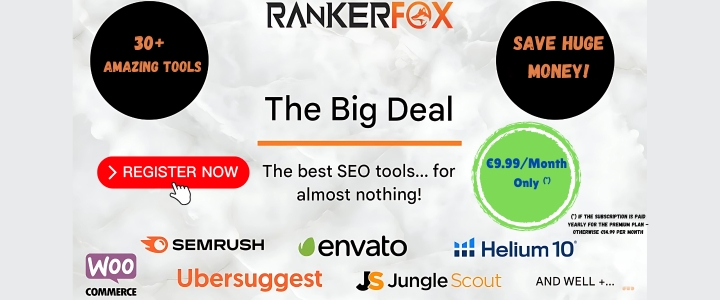
Why Email Marketing Automation is Crucial in 2025
In today’s competitive environment, email marketing is no longer about sending one-size-fits-all messages. Customers expect personalized content delivered at the right time. Without email marketing automation, it’s virtually impossible to meet these expectations while managing the scale and complexity of modern marketing campaigns.
Email marketing automation simplifies this process by:
- Streamlining Repetitive Tasks: Activities like sending welcome emails, following up on abandoned carts, or segmenting contact lists can be automated, freeing up time for more strategic tasks.
- Personalizing Customer Experiences: By leveraging data, automation tools allow businesses to send tailored messages that resonate with each recipient.
- Providing Actionable Insights: These platforms offer analytics to track open rates, click-through rates, and overall campaign performance, enabling continuous improvement.
- Scaling Effortlessly: Whether you have 100 subscribers or 100,000, email marketing automation tools ensure that your campaigns run smoothly, regardless of scale.
With email marketing continuing to deliver some of the highest ROI in digital marketing, leveraging email marketing automation is no longer optional—it’s essential for success.
What Makes a Great Email Marketing Automation Platform?
When evaluating email marketing automation platforms, it’s important to consider features that will align with your business goals and help you achieve better results. Here are the key criteria to look for when choosing a platform:
1. AI-Powered Personalization
Personalization has become the gold standard in marketing, and AI is taking it to the next level. Platforms equipped with AI can analyze data such as browsing behavior, purchase history, and email interactions to create highly targeted campaigns. For instance, AI-driven tools can recommend the best products for each recipient or suggest optimal sending times to maximize engagement.
The ability to dynamically adjust content based on real-time customer actions not only improves relevance but also enhances customer satisfaction and loyalty.
2. Seamless Integrations
Most businesses already rely on tools like customer relationship management (CRM) systems, e-commerce platforms, and social media schedulers. The email marketing automation platform you choose should integrate seamlessly with these tools to ensure smooth data flow.
For example, integrating with your CRM allows you to sync customer data, making it easier to create targeted campaigns. Similarly, integration with e-commerce platforms can help automate workflows like abandoned cart emails or product recommendations.
3. Easy-to-Use Interface
Ease of use is critical, especially for small businesses or teams without extensive technical expertise. Look for platforms with drag-and-drop editors, intuitive dashboards, and step-by-step guidance for setting up automation workflows.
A user-friendly interface ensures that you can quickly create campaigns, test new ideas, and manage your email marketing automation strategy without frustration or delays.
4. Advanced Reporting and Analytics
Data-driven decision-making is at the heart of successful marketing. The best email marketing automation platforms provide detailed analytics on metrics like open rates, click-through rates, conversions, and overall ROI.
Some tools also offer heatmaps, showing which parts of your email attract the most attention. These insights help refine your strategy, ensuring that your emails continually improve in performance and effectiveness.
5. Scalability and Flexibility
As your business grows, your email marketing automation needs will evolve. A good platform should be able to scale with you, handling larger subscriber lists, more complex workflows, and increasing campaign frequency.
Additionally, the platform should offer flexibility in terms of customization, allowing you to tailor automation workflows, templates, and content to fit your specific needs.
The 10 Best Email Marketing Automation Platforms in 2025
Here’s a detailed breakdown of the leading email marketing automation platforms this year:
1. HubSpot
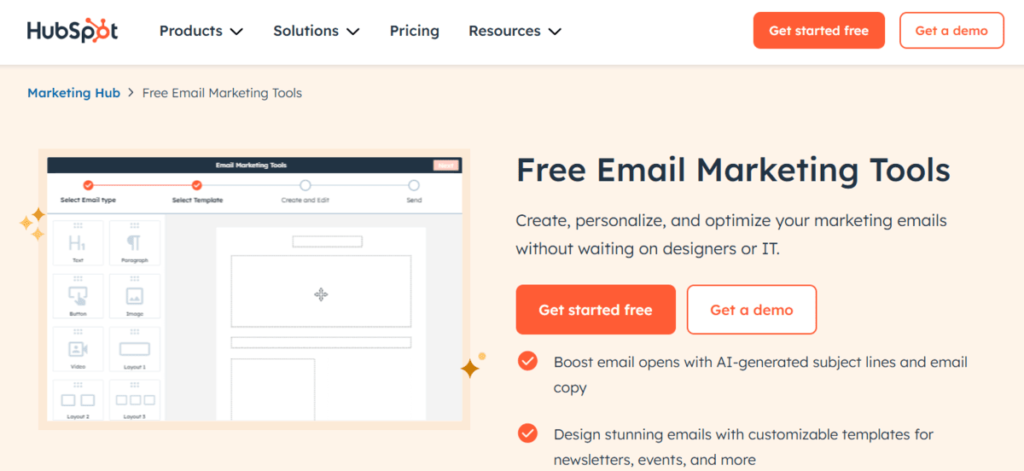
HubSpot is a comprehensive platform that combines email marketing automation, CRM, sales, and customer service tools. It’s designed to provide an all-in-one solution for businesses seeking a unified marketing and customer management system.
Key Features:
- Powerful automation workflows that allow for multi-step customer journeys.
- AI-driven tools for dynamic content personalization and predictive lead scoring.
- A centralized CRM that connects seamlessly with email marketing campaigns for better data management.
Pricing: Free plan available; premium plans start at $50/month.
Best For: Businesses of all sizes, especially those looking for a complete marketing and sales solution.
2. Mailchimp
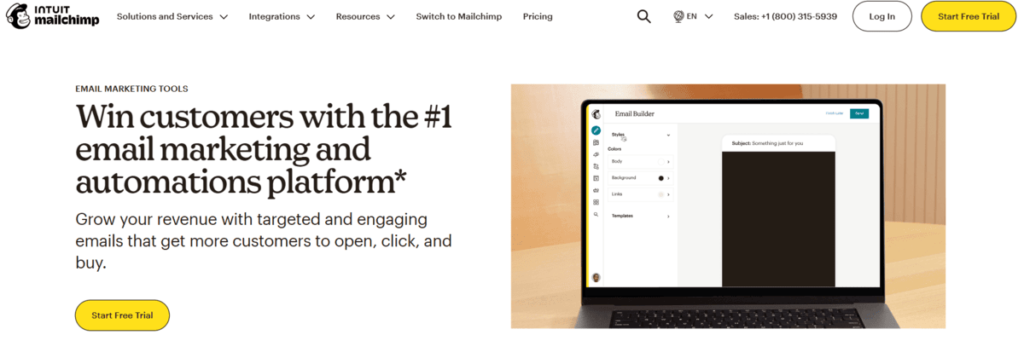
Mailchimp is a user-friendly platform that’s particularly popular among small businesses and startups. Its straightforward interface and affordable pricing make it accessible to users with little to no technical experience.
Key Features:
- Pre-designed templates for quick and easy email creation.
- Customer journey builder for automated email sequences.
- Integration with a wide range of third-party tools like Shopify and WordPress.
Pricing: Free plan available; premium plans start at $13/month.
Best For: Beginners and small businesses looking for simplicity and affordability.
3. Klaviyo
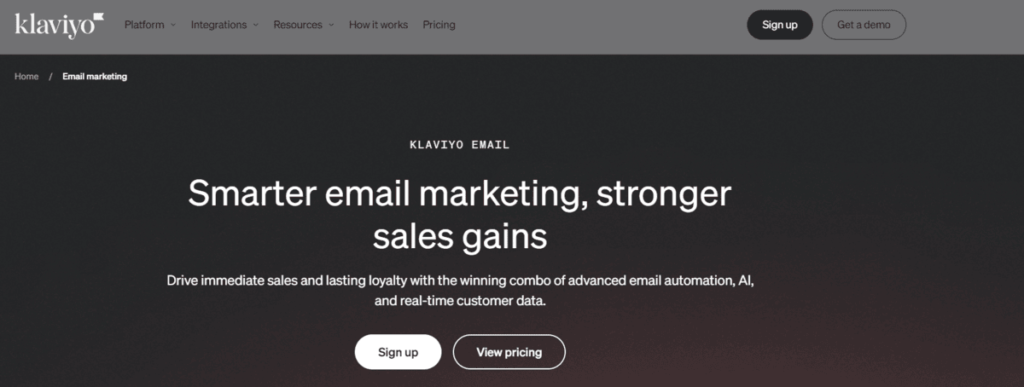
Klaviyo specializes in e-commerce email marketing automation, offering robust tools for personalized customer engagement. It’s particularly well-suited for online stores that want to increase revenue through targeted campaigns.
Key Features:
- Real-time tracking of customer behavior to inform campaign decisions.
- Advanced segmentation based on factors like browsing history, purchase history, and location.
- Pre-built automation workflows specifically designed for e-commerce use cases.
Pricing: Free for up to 250 contacts; pricing scales with usage.
Best For: E-commerce businesses focused on driving sales and increasing customer retention.
4. ActiveCampaign

ActiveCampaign is known for its sophisticated email marketing automation capabilities, which allow businesses to create highly personalized campaigns tailored to individual customer journeys.
Key Features:
- Conditional logic to customize workflows based on user behavior and preferences.
- Integration of email and SMS marketing for multi-channel campaigns.
- Machine learning tools to predict the best sending times and content for each recipient.
Pricing: Plans start at $29/month.
Best For: Small to medium-sized businesses with a focus on advanced automation.
5. Constant Contact
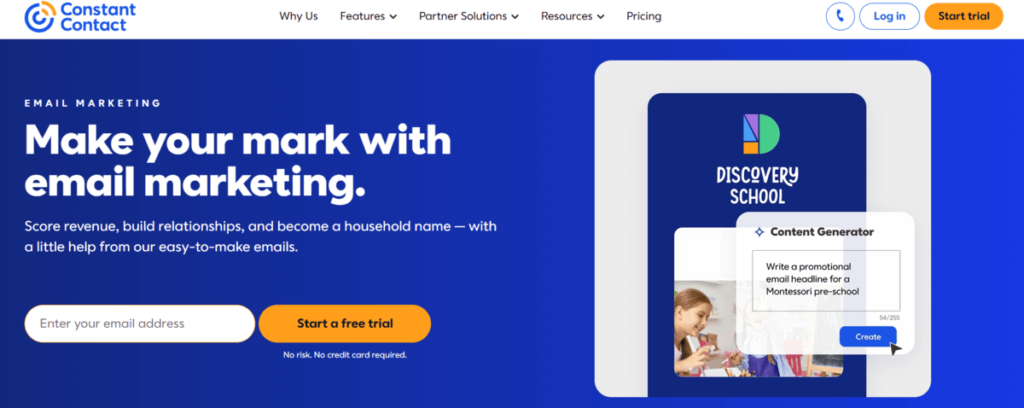
Constant Contact is an established platform with a focus on event-driven marketing and straightforward email marketing automation.
Key Features:
- Event registration and promotion tools integrated with email marketing campaigns.
- Social media scheduling and ad management features.
- A wide range of templates for newsletters, promotions, and surveys.
Pricing: Plans start at $12/month.
Best For: Nonprofits, event organizers, and small businesses.
6. Brevo
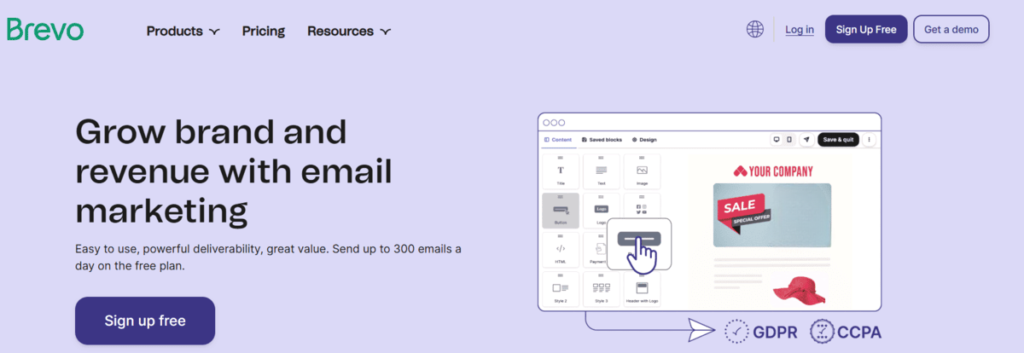
Brevo is a cost-effective solution for businesses that need both email marketing automation and SMS marketing capabilities.
Key Features:
- Multi-channel marketing tools, including email, SMS, and live chat.
- Visual automation builder for creating complex workflows.
- Real-time tracking of campaign performance and engagement metrics.
Pricing: Free plan (up to 300 emails/day); paid plans start at $25/month.
Best For: Budget-conscious businesses seeking multi-channel marketing tools.
7. GetResponse

GetResponse stands out for its versatile features, including tools for webinars, sales funnels, and advanced email marketing automation.
Key Features:
- Webinar hosting capabilities to engage audiences and generate leads.
- Funnel builder for creating customer journeys that guide leads to conversion.
- Detailed analytics and A/B testing to optimize performance.
Pricing: Plans start at $19/month.
Best For: Businesses looking for an all-in-one platform with webinar and funnel-building capabilities.
8. Omnisend
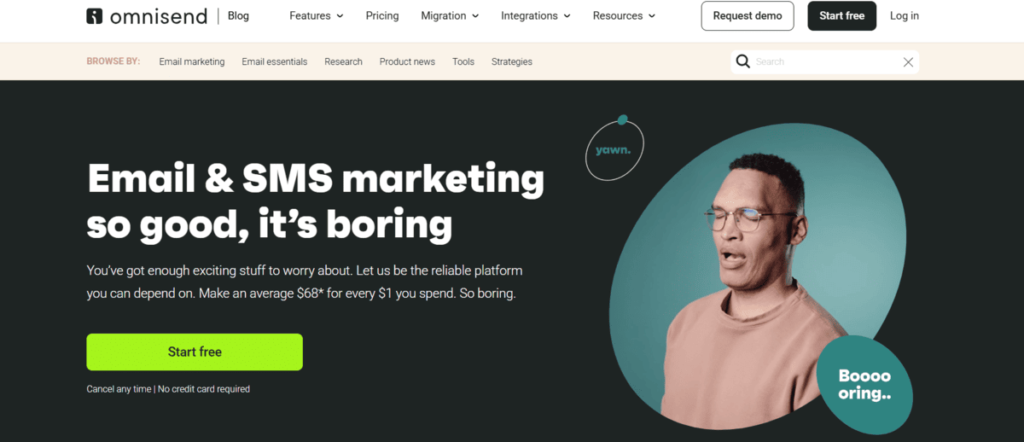
Omnisend is tailored for e-commerce businesses, offering tools to manage email marketing automation, SMS, and social media campaigns in one place.
Key Features:
- Pre-built workflows for abandoned carts, order confirmations, and welcome emails.
- Automation across email, SMS, and social media for consistent messaging.
- Advanced audience segmentation based on purchase history and engagement.
Pricing: Free for up to 500 emails/month; paid plans start at $16/month.
Best For: E-commerce businesses with a focus on multi-channel marketing.
9. Drip

Drip focuses on helping e-commerce brands create meaningful customer connections through targeted and personalized email marketing automation.
Key Features:
- Advanced segmentation capabilities to tailor messages to specific customer groups.
- Integration with e-commerce platforms like Shopify and Magento.
- Revenue attribution for individual campaigns to measure ROI.
Pricing: Plans start at $39/month.
Best For: E-commerce brands that prioritize customer relationships and revenue tracking.
10. Moosend

Moosend is a budget-friendly platform that offers essential features for startups and small businesses looking for email marketing automation.
Key Features:
- Drag-and-drop email editor for quick campaign creation.
- Customizable landing pages to boost lead generation.
- Advanced analytics to monitor campaign performance.
Pricing: Plans start at $9/month.
Best For: Startups and small teams with tight budgets.
Comparing the Top Platforms
Here’s a summary of how the platforms stack up:
| Platform | Best For | Starting Price | Key Features |
|---|---|---|---|
| HubSpot | All-in-one solution | $50/month | AI-powered automation workflows |
| Mailchimp | Small businesses and beginners | $13/month | Pre-designed templates |
| Klaviyo | E-commerce businesses | Free (250 contacts) | Real-time behavior tracking |
| ActiveCampaign | Advanced automation | $29/month | Conditional logic workflows |
| Constant Contact | Event-driven marketing | $12/month | Event registration tools |
| Sendinblue | Multi-channel marketing | $25/month | Email and SMS integration |
| GetResponse | Webinar and funnel tools | $19/month | Webinar hosting and analytics |
| Omnisend | E-commerce multi-channel | $16/month | Pre-built e-commerce workflows |
| Drip | Customer-focused e-commerce | $39/month | Revenue tracking and segmentation |
| Moosend | Budget-conscious startups | $9/month | Custom landing pages |
Conclusion
Email marketing automation is a game-changer for businesses in 2025. Whether you’re looking to scale, boost engagement, or improve ROI, these platforms offer solutions to meet your needs. Take time to evaluate your goals, explore features, and choose the platform that will empower your business to grow.
Ready to transform your email marketing automation strategy? Choose one of these platforms, sign up for a free trial, and take the first step toward automation success!
Additional Considerations for Choosing the Right Platform
While the above platforms offer a range of features and benefits, it’s important to consider additional factors that can influence your decision:
1. Customer Support
The level of customer support provided by the platform can be a deciding factor, especially for businesses without a dedicated IT team. Look for platforms that offer 24/7 support, live chat, or dedicated account managers.
2. Trial Periods and Demos
Many platforms offer free trials or demos, allowing you to test their features before committing. Take advantage of these opportunities to ensure the platform meets your needs.
3. Compliance with Regulations
Ensure that the platform complies with email marketing regulations like GDPR and CAN-SPAM. This is crucial for maintaining trust and avoiding legal issues.
4. Community and Resources
Some platforms offer extensive resources like tutorials, webinars, and community forums. These can be invaluable for learning best practices and troubleshooting issues.
5. Customization Options
The ability to customize templates, workflows, and reports can significantly impact the effectiveness of your campaigns. Choose a platform that offers flexibility in this area.
Final Thoughts
Email marketing automation is no longer a luxury—it’s a necessity for businesses aiming to stay competitive in 2025. By leveraging the right platform, you can streamline your marketing efforts, deliver personalized experiences, and achieve measurable results. Whether you’re a small business owner, an e-commerce entrepreneur, or a marketing professional, there’s a platform on this list that’s perfect for your needs.
Take the time to explore your options, consider your business goals, and choose a platform that aligns with your vision. With the right tools and strategies, you can transform your email marketing automation efforts and drive your business toward greater success.
Ready to Get Started?
Now that you’ve explored the top email marketing automation platforms of 2025, it’s time to take action. Sign up for a free trial, experiment with different features, and see how email marketing automation can revolutionize your marketing strategy. The future of email marketing is here—don’t get left behind!

